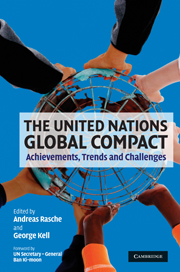Book contents
- Frontmatter
- Contents
- List of figures
- List of tables
- List of boxes
- List of abbreviations
- List of contributors
- Acknowledgements
- Foreword
- Why This Book Matters!
- The Ten Principles of the United Nations Global Compact
- 1 Introduction: the United Nations Global Compact – retrospect and prospect
- Part I Achievements, trends and challenges: reflections on the Principles
- 2 Making sense of the United Nations Global Compact human rights principles
- 3 The promise of the United Nations Global Compact: a trade union perspective on the labour principles
- 4 The United Nations Global Compact Environmental Principles: achievements, trends and challenges
- 5 ‘Caring for Climate’: the Business Leadership Platform
- 6 Anti-corruption: challenges and trends
- Part II Participants and engagement mechanisms
- Part III Governance and Communication on Progress
- Part IV Local Networks: the emerging global–local link
- Glossary
- Bibliography
- Index
4 - The United Nations Global Compact Environmental Principles: achievements, trends and challenges
Published online by Cambridge University Press: 05 February 2012
- Frontmatter
- Contents
- List of figures
- List of tables
- List of boxes
- List of abbreviations
- List of contributors
- Acknowledgements
- Foreword
- Why This Book Matters!
- The Ten Principles of the United Nations Global Compact
- 1 Introduction: the United Nations Global Compact – retrospect and prospect
- Part I Achievements, trends and challenges: reflections on the Principles
- 2 Making sense of the United Nations Global Compact human rights principles
- 3 The promise of the United Nations Global Compact: a trade union perspective on the labour principles
- 4 The United Nations Global Compact Environmental Principles: achievements, trends and challenges
- 5 ‘Caring for Climate’: the Business Leadership Platform
- 6 Anti-corruption: challenges and trends
- Part II Participants and engagement mechanisms
- Part III Governance and Communication on Progress
- Part IV Local Networks: the emerging global–local link
- Glossary
- Bibliography
- Index
Summary
Introduction
The environmental principles of the United Nations Global Compact represent recognition by the community of nations of the role corporations must play if we are to successfully address pending global environmental concerns. This chapter will explore the environmental principles of the Global Compact by first examining their roots in international environmental diplomacy and sustainable development discourse. It will then review the rising importance of multinational corporations (MNCs) in the global economy and the contributions that private enterprise can offer in achieving established global environmental goals. The Global Compact environmental principles will then be surveyed with a special emphasis on their prospective role in addressing one of the most complex and challenging environmental issues: global climate change. Finally current trends in environmental management will be traced with specific examples of companies implementing the Global Compact environmental principles in their strategy and operations.
Many business people see the UN Global Compact as another, albeit authoritative, set of sustainability guidelines produced by government and civil society to influence corporate behaviour vis-à-vis the natural world. This view, however, misunderstands the significance of the Global Compact in the evolution of global governance. Since the Treaty of Westphalia (1659), which most scholars pinpoint as the beginning of the modern system of international law and relations, the only recognized entity in international policy-making – as the name implies – has been the nation-state (Gross 1948).
- Type
- Chapter
- Information
- The United Nations Global CompactAchievements, Trends and Challenges, pp. 59 - 79Publisher: Cambridge University PressPrint publication year: 2010



